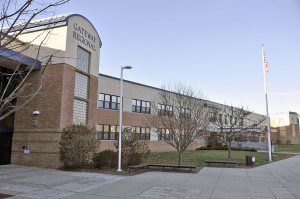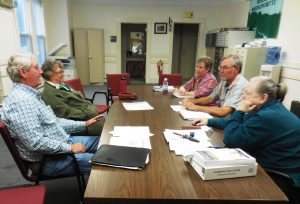 HILLTOWNS – Special town meetings are scheduled for the three towns that did not pass the FY18 Gateway Regional school budget at their annual town meetings this spring. Huntington’s meeting will be held on Wednesday, August 9 beginning at 6:30 in Stanton Hall, Russell’s on Thursday, August 10 at 6:30 p.m. in the town hall, and Chester’s on Saturday, August 12 at 1:00 p.m. in the town hall.
HILLTOWNS – Special town meetings are scheduled for the three towns that did not pass the FY18 Gateway Regional school budget at their annual town meetings this spring. Huntington’s meeting will be held on Wednesday, August 9 beginning at 6:30 in Stanton Hall, Russell’s on Thursday, August 10 at 6:30 p.m. in the town hall, and Chester’s on Saturday, August 12 at 1:00 p.m. in the town hall.
With Blandford, Middlefield, and Montgomery having passed their above minimum contributions, those three towns do not need to vote again. Since four towns are needed for passage, at least one of the remaining towns must vote for the budget in order for it to go forward. Meanwhile, the district has been put on a 1/12th (month-to-month) budget based on FY17 by the Department of Elementary and Secondary Education (DESE).
The three towns that are voting were the only ones to receive an increase in their minimum contributions, which are based on enrollment and percentage of students in the district. Russell’s increase was almost $200,000 and Huntington’s nearly $140,000. Each town’s share of the student population is 30%. Chester’s increase was approximately $14,000 over FY17.
Chester was the last town to vote on the school budget the first time around, and this time as well, giving it again the deciding vote. At the annual town meeting, Finance Committee chair Andrew Myers said one reason to vote against the budget was to support Russell and Huntington.
“Russell can’t afford that (increase). Our decision is, are we going to join those towns that voted the budget down and said they can’t afford it,” Myers said at the town meeting.

Gateway Regional Administrative Assistant Stacy Stewart, School Committee chair Michele Crane, and Superintendent Dr. David B. Hopson. (Photo by Amy Porter)
Gateway Regional Budget Version 2, which the towns will be voting on next week, was reduced overall by $105,908, and resulted in a $7,000+ decrease in the above minimum contributions to Huntington and Russell, and $1,000+ to Chester.
Hopson acknowledged that the amounts they were able to cut for town assessments weren’t what they were hoping for. “There’s not anything left to cut that doesn’t impact student services,” he said on Tuesday.
At the Gateway Towns Advisory Committee (GTAC) meeting last Thursday, representatives from the towns said they were disappointed by the amount of the reductions. “How concerned can they be about the towns, the district and the impact on two of the towns,” said Darlene McVeigh, one of two newly elected Huntington selectmen and former Finance Committee chair for the town.
Myers said at the town meetings, three towns made it very clear that they could not pass the budget as it stands. “It was a cosmetic change; it wasn’t a serious change,” he said.
The district and the towns have been in this situation before. Last year, the budget passed on its first try; but two years ago, after at least three rounds of special town meetings, the district failed to get a majority of the towns to pass it. DESE then set the budget for the district, and required them to hire a consultant.
The Massachusetts Association of Retired Superintendents (MARS) sent a team, which met with all the stakeholders and issued a report on its findings. One of the recommendations in the report is for the district to involve the towns more in the budget process. The School Committee has acted on this recommendation, and has scheduled four joint FY19 budget meetings with assigned representatives from the towns, beginning on September 13.

GTAC Committee members Andrew Myers of Chester, Noreen Suriner of Middlefield, Darlene McVeigh of Huntington, and Derrick Mason and Ruth Kennedy of Russell. (Photo by Amy Porter)
In addition, Hopson sent out a letter in July regarding a separate facilitated discussion with the six towns as recommended in the MARS report. The letter, which was approved by the School Committee at its June 7 meeting, said the district would be willing to pay $1,000 towards the cost of the meetings.
Other issues to be worked out include a location, dates, times, agenda items, amount of money each town is willing to allocate, and selection of facilitators. Hopson said two of the MARS team are willing to facilitate. He also suggested that Zack Blake of the Division of Local Services, who has been working on financial issues with the towns through the Hilltown Collaborative, be asked to participate.
Hopson said he expects the facilitated discussion to be over and above the budget process. He said MARS pointed out the need for long range planning around annual budgets and capital budgets.
“I just hope that as we move forward, we can air our differences and move forward in a positive manner,” Hopson added.
The facilitated meetings were also a point of discussion at the GTAC meeting. Myers pointed out that the towns will have an equal seat at the table. “We need to talk not only about next year, but 5-10 years down the road,” Myers said, adding that the environment has changed in the district, and the situation is not sustainable for the towns.
Both the facilitated meetings and the budget discussions will start with the FY19 budget and look forward. When asked whether failing to pass the FY18 budget will impact the process, Hopson said the School Committee would still go forward with the planned meetings.
However, Hopson said the current 1/12th budget leaves the district $160,000 short, and would impact the planning for the FY19 budget. “How do you make it up? How do you account for that going forward?” Hopson asked.
For many reasons, Hopson is hoping for at least one town of the three to pass the budget this month. “It would certainly make the teachers feel more comfortable,” he said.
If the budget does not pass, the School Committee will have thirty days to put forward another budget. Since the School Committee does not meet again until August 23, Hopson said they may have to ask DESE for an extension.

